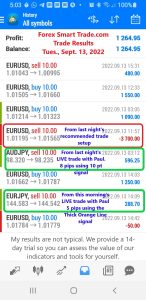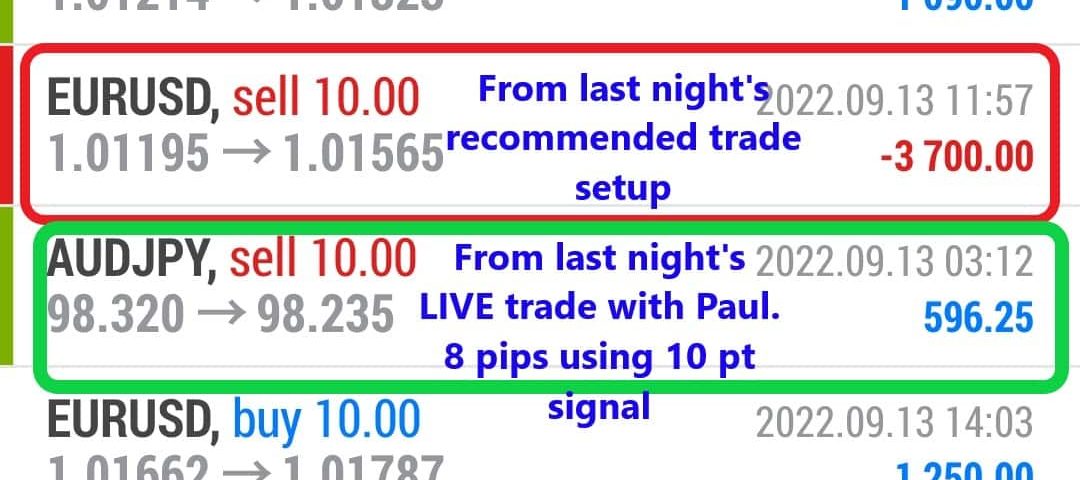Forex Smart Trade Results September 13, 2022 – $1,264

Forex Smart Trade Results September 12, 2022 – $2,110
September 12, 2022
Forex Smart Trade Results September 14, 2022 – $3,760
September 14, 2022Finding the Right Forex Broker.
Continuing our discussion regarding finding the right forex broker,
YOU DON’T WANT TO BE ON YOUR OWN.
Due to the company not being regulated, you wouldn’t have access to complaints procedures or compensation schemes in the event that something goes wrong.
There will be no regulatory agency to turn to resolve disputes fairly and impartially and have the power to put things right.
Why should you pick a regulated forex broker?
A regulated forex broker means it must comply with standards set by the regulatory agency.
This helps ensure that the way the forex broker conducts business with you is ethical and fair.
If they do not satisfy you with the level of service, or if you think you’re being scammed by your broker, you can report a regulated broker to its regulatory agency.
A regulatory agency rarely gets directly involved in any conflict between a company and its customer.
It will investigate any instances of fraud or consumer abuse.
If found guilty, the regulatory agency can issue big fines and revoke their license. And in some cases, even permanently ban the broker from operating in the country.
By requiring forex brokers to operate within a set of rules as defined by the forex regulatory agencies, retail traders can some confidence that when trading with the forex broker, they are treated in a fair and ethical manner.
Lastly, why wouldn’t you trade with a regulated forex broker? Why would you choose a broker who deliberately avoids being under a strict regulatory agency?
We’re not saying that every unregulated broker wants to cheat you out of your money but given that the retail forex industry has a history of being prone to fraud, why take the chance?
How to Verify A Broker’s Regulatory Status
Every forex broker who is licensed and allowed to operate by their regulatory agency receives a unique ID number.
Regulated brokers are required to display their regulatory information prominently on their website so you should be able to easily spot their ID number (usually at the bottom of every page).
A broker may claim to be based out of a specific jurisdiction but is actually lying. The company could be falsely claiming another company’s ID number or worse, totally making up a fake ID number.
This is why it’s important to make sure to VERIFY this ID number on the official regulatory agency’s website.
To help traders, like you, verify the regulatory status of a forex broker, most regulatory agencies maintain an online database that you can access in order to verify whether a broker is truly regulated by the specific agency.
A regulatory agency’s website should provide information about a broker, its owners and company executives, a brief history of its operations, and any regulatory actions there were taken against the broker due to non-compliance issues or customer complaints.
For example, a forex broker may claim to be licensed to operate in the U.K. by displaying an FCA Register Number.
Rather than just blindly believe it though, you should visit the FCA’s website and verify their FCA license yourself.
We can do verification by performing a quick search on the FCA’s website. You can search by name or by number and check if the regulatory information on the broker’s website matches.
If the broker is listed, verify the contact details listed are what’s listed on the company’s website.
There are scam brokers who pretend to be the listed company. This is why it’s important to use the contact details that are registered to confirm you’re dealing with the actual company before doing business with them.
If you’re unsure about a broker’s regulatory status, contact the broker directly and inquire about their current regulatory status. If you don’t get an answer, that’s a red flag.

Learn to Currency Day Trade Forex
If you’d like to earn extra income trading on the Forex market, consider learning how to currency trade with Forex Smart Trade. With their super-accurate proprietary trading tools and best-in-the-business, personalized one-on-one training, you’ll be successful. Check out the Forex Smart Trade webinar. It shows one of their trader’s trading and how easy, intuitive, and accurate the tools are. Or try the Forex Smart Trade 14-day introductory trial for just TEN dollars.



